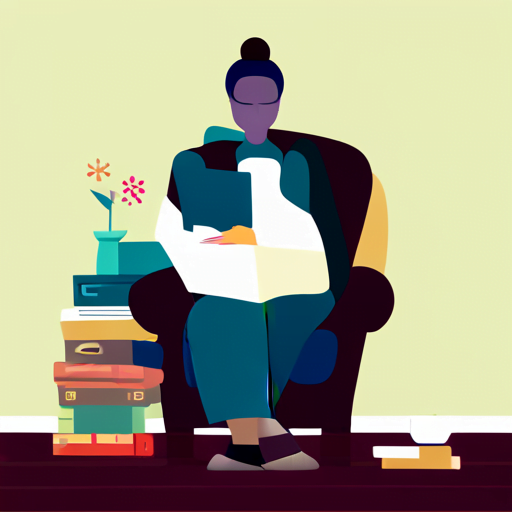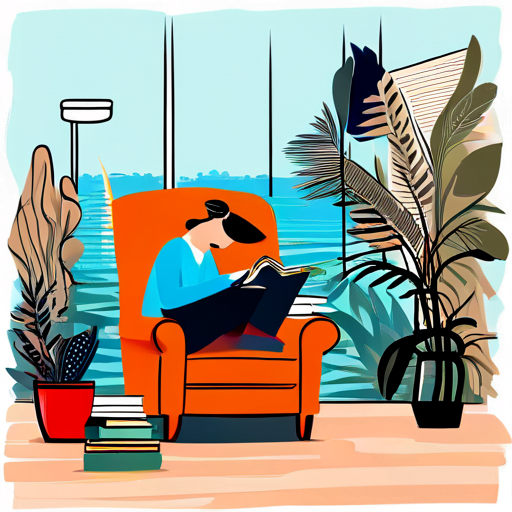Are you feeling overwhelmed and stressed out? Do you need a break from the chaos of daily life? Consider reaching for a book.
Reading has been scientifically proven to be a great stress reliever, helping to calm the mind and relax the body.
Studies have shown that reading for just six minutes can lower your heart rate and reduce stress levels.
When you read, your brain is forced to focus on the words on the page, allowing you to escape from the worries and anxieties of the real world. It’s like a mini-vacation for your mind.
So, if you’re looking for a way to relax and unwind, grab a book and let the words transport you to a peaceful state of mind.
Table of Contents
The Science Behind Reading for Stress Relief

You’re probably wondering how diving into a good book can make you feel like a weight has been lifted off your shoulders. Well, let’s break it down with some science.
Studies have shown that reading can decrease stress levels by up to 68%. This is because reading helps to slow down your heart rate and reduce muscle tension. It also helps to distract your mind from the stresses of daily life.
When you read, your brain enters a state of relaxation. This is because reading requires concentration and focus, which can take your mind off of your worries. The act of reading also triggers your imagination, which can transport you to another world and provide a much-needed escape from reality.
This can be especially helpful during times of high stress or anxiety. Reading also has long-term benefits for your mental health. Studies have shown that people who read regularly have a lower risk of developing Alzheimer’s disease and other forms of dementia.
It can also improve your vocabulary, cognitive function, and overall well-being. So, the next time you’re feeling stressed or overwhelmed, pick up a book and let yourself get lost in the pages.
The Types of Books That Are Best for Stress Relief

When it comes to reading for stress relief, there are different types of books that can help you find calm in the pages. Fiction and non-fiction books have their unique benefits.
While fiction allows you to escape into a different world, non-fiction can offer practical advice to help you deal with stress. Additionally, self-help books can be particularly useful in guiding you towards a more positive mindset.
Fiction vs Non-Fiction
Whether it’s escaping to a different world or expanding your knowledge, the choice between fiction and non-fiction can make all the difference in the emotional impact of your reading.
Fiction books provide a great opportunity to get lost in a story and forget about your own problems for a while. They can take you to different places and times, introducing you to new characters and experiences. Reading fiction has been found to reduce stress levels by allowing you to focus on something outside of your own life.
On the other hand, non-fiction books can also be beneficial for stress relief. They offer the opportunity to learn something new, which can be empowering and enriching. Non-fiction books can help you gain new perspectives on life and provide you with tools to manage stress and anxiety.
Whether it’s a self-help book, a memoir, or a historical account, non-fiction can offer a sense of control and understanding in a chaotic world. Ultimately, the choice between fiction and non-fiction comes down to personal preference and what you need in the moment.
Both can provide a sense of escape and relief, and both can be valuable in reducing stress.
The Benefits of Reading Self-Help Books
Boost your personal growth with the valuable insights and empowering strategies found in self-help books. These books are designed to help you improve your life by providing you with practical tips and techniques for managing stress, achieving your goals, and developing a positive mindset.
Whether you’re dealing with a difficult situation or just looking to improve your overall well-being, self-help books can provide you with the tools and guidance you need to succeed. One of the biggest benefits of reading self-help books is that they can help you develop a more positive outlook on life.
By learning new strategies for managing stress and cultivating a growth mindset, you can begin to see yourself and your life in a more positive light. This can lead to improved relationships, increased confidence, and a greater sense of purpose.
So if you’re looking to improve your life and find greater peace and happiness, consider picking up a self-help book today.
The Power of Escapism in Fiction
Immerse yourself in the captivating world of fiction and experience the transformative power of escapism.
There’s something magical about getting lost in a good book, feeling like you’re transported to a different time and place.
It’s a chance to forget about your own worries and problems, and instead focus on the lives of fictional characters.
The power of escapism is that it allows you to take a break from reality and find a sense of calm in the pages.
Reading fiction can be incredibly therapeutic, especially when you’re feeling stressed or overwhelmed.
It’s a chance to disconnect from the world around you and fully engage in another story.
Whether you prefer mystery, romance, or fantasy, there’s a genre out there for everyone.
The power of fiction lies in its ability to transport you to another world and allow you to experience different emotions and perspectives.
So next time you’re feeling stressed, pick up a book and let yourself escape into a different world.
Tips for Incorporating Reading into Your Self-Care Routine

If you’re looking to incorporate reading into your self-care routine, there are a few things you should keep in mind.
First, you need to make time for it. Whether it’s a few minutes before bed or during your lunch break, find a time that works for you.
Next, create a relaxing reading environment. This could mean finding a cozy nook in your home or using noise-cancelling headphones.
Finally, set realistic goals for reading. Don’t try to read a whole book in one sitting if you know you don’t have the time or energy. Start small and build up from there.
Making Time for Reading
You may benefit from incorporating a scheduled period of uninterrupted leisure into your daily routine. This is especially important if you’re struggling to make time for reading.
One way to do this is to set aside a specific time each day for reading, such as before bed or during your lunch break. By making it a habit, you’ll be more likely to stick to it and enjoy the stress-relieving benefits of getting lost in a good book.
Another way to make time for reading is to limit your screen time. Instead of mindlessly scrolling through social media or binge-watching your favorite show, try swapping out some of that time for reading. Not only will it give your eyes a break, but it’ll also provide you with a mental escape from the stresses of daily life.
Remember, taking care of yourself is important, and making time for reading can be a simple yet effective way to do so.
Creating a Relaxing Reading Environment
Creating a cozy atmosphere conducive to relaxation is an important step in fully embracing the therapeutic benefits of losing oneself in a good book. Start by choosing a comfortable spot in your home where you can read without distractions. This could be a corner of your bedroom, a cozy armchair in the living room, or even a sunny spot in your backyard.
Make sure the lighting is soft and not too bright, and consider adding some soft blankets or pillows for added comfort. Next, eliminate any potential distractions that may pull you out of your reading zone. Turn off your phone or put it on silent, and avoid reading in a room with a television or other electronics that may be tempting to turn on.
If you enjoy background noise, consider playing some soft instrumental music or natural sounds like rainfall or ocean waves. Finally, make sure you have everything you need nearby, such as a glass of water or tea, so you don’t have to interrupt your reading flow.
With the right environment, you’ll be able to fully immerse yourself in your book and let the stress of the day melt away. Remember, reading is not just a hobby or a pastime – it’s also a powerful tool for stress relief and relaxation. By creating a comfortable and calming atmosphere for your reading time, you’ll be able to fully embrace the therapeutic benefits of losing yourself in a good book.
So take a deep breath, grab your favorite novel, and settle in for some much-needed relaxation.
Setting Realistic Goals for Reading
Now that you’ve created a relaxing reading environment, it’s time to set some realistic goals for your reading. Setting achievable goals will help you stay motivated and not get overwhelmed. It’s important to remember that reading is supposed to be enjoyable and stress-relieving, not a chore.
Start by assessing how much time you realistically have to devote to reading each day. It could be as little as 10 minutes or as much as an hour. Once you have a clear idea of your available reading time, set a goal for how many pages or chapters you want to read during that time.
Keep in mind that it’s better to set a smaller goal and exceed it than to set an unrealistic goal and feel discouraged when you don’t meet it. By setting achievable reading goals, you’ll be able to enjoy the process of reading and feel a sense of accomplishment as you reach each goal.
Other Stress-Relief Techniques to Try Alongside Reading

If you’re looking for other ways to unwind and relax, there are plenty of options to explore alongside reading. One popular method is meditation, which involves focusing your attention on your breath and clearing your mind of distracting thoughts. You can try guided meditations through apps or online resources, or simply sit quietly and focus on your breath for a few minutes each day.
Another stress-relief technique to consider is practicing yoga or stretching. These activities can help release tension in your muscles and promote relaxation throughout your body. You can find beginner classes online or at a local yoga studio, or simply incorporate a few stretches into your daily routine.
Finally, spending time in nature can also be a great way to reduce stress. Whether it’s taking a walk in the park, going for a hike, or simply sitting outside in a quiet spot, being in nature has been shown to have a calming effect on the body and mind.
So, if you’re feeling overwhelmed, consider taking a break and spending some time outside.
Frequently Asked Questions
What are the potential negative effects of reading for stress relief?
If you rely too heavily on reading as a coping mechanism for stress, it can actually have negative effects on your mental health. Reading can be a wonderful escape, but if you’re using it as a way to avoid dealing with your problems, it can become a form of avoidance.
This can lead to feelings of guilt and shame, and prevent you from seeking help or making positive changes in your life. Additionally, if you’re reading at the expense of other important activities like exercise, socializing, or self-care, it can have a negative impact on your overall well-being.
So, while reading can be a great way to unwind and relax, it’s important to use it in moderation and in conjunction with other healthy coping mechanisms.
How long does it typically take for reading to have an effect on reducing stress?
You might be wondering how long it takes for reading to have an effect on reducing stress. The answer is, it depends on the individual and the situation.
Some people may feel a sense of calm and relaxation after just a few pages, while others may need to read for longer periods of time. Additionally, the type of book you’re reading can also play a role in how quickly you feel the benefits.
For example, a book on mindfulness or self-help may have a more immediate impact on reducing stress than a thrilling novel. Ultimately, the key is to find what works best for you and make reading a regular part of your stress-relief routine.
Is reading in a specific location or environment more effective for stress relief?
When it comes to finding a calm and stress-free environment for reading, it’s all about personal preference.
Some people prefer a quiet and secluded spot, like a cozy corner in their home or a peaceful park bench.
Others may find comfort in a bustling coffee shop or a lively bookstore.
Ultimately, the key is to choose a location that makes you feel relaxed and at ease.
Whether you prefer the serenity of silence or the hum of activity, the right environment can enhance the benefits of reading for stress relief and provide a much-needed escape from the pressures of everyday life.
Are there any specific genres or authors that should be avoided for stress relief reading?
When looking for stress relief through reading, it’s important to consider the genre and author of the book you choose. While everyone is different, there are certain genres and authors that may not be the best for calming your mind.
For example, horror or suspenseful books may only increase your stress levels. Additionally, authors who write about heavy topics like war or tragedy may not be the best choice for relaxation.
Instead, consider books in the romance or comedy genres, or authors who specialize in uplifting or motivational content. Ultimately, the best choice for stress relief reading will vary from person to person, so it’s important to experiment and find what works best for you.
Can audiobooks or e-books be just as effective for stress relief as physical books?
If you’re looking for a way to relax and escape from the stress of daily life, audiobooks and e-books can be just as effective as physical books.
With the convenience of being able to carry a library of books in your pocket, you can easily access your favorite stories and immerse yourself in a different world.
Plus, audiobooks offer the added benefit of being able to listen while doing other activities, such as commuting or exercising.
Whether you prefer the feel of a physical book or the convenience of digital formats, the important thing is finding a form of reading that brings you calm and relaxation.
Conclusion
So there you have it – the science behind why reading is a great stress relief activity, the types of books that are best for calming your mind, and tips for incorporating reading into your self-care routine.
Remember, reading doesn’t have to be a chore – it can be a way to escape from the stresses of our daily lives and find peace in the pages.
But don’t forget to mix it up and try other stress-relief techniques alongside reading, such as meditation, exercise, or spending time in nature.
By finding what works best for you, you’ll be on your way to a calmer, more centered life.
So go ahead, pick up that book that’s been sitting on your shelf and let the words transport you to a place of relaxation and tranquility.
